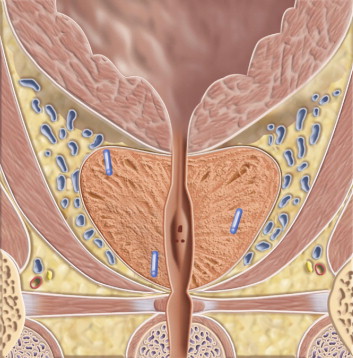What Are Gold Seeds (Fiducial Markers)?
Gold seed, salso known as fiducial markers, are tiny, inert markers inserted into the prostate to assist with accurate targeting during radiotherapy planning and treatment for prostate cancer.
These markers help your radiation oncologist precisely locate the prostate during treatment, improving the accuracy and safety of radiation delivery.
At Urology SA, Dr Jehan Titus is committed to precision in prostate cancer treatment. He has extensive experience in the safe placement of fiducial markers and rectal spacers and works in close collaboration with radiation oncologists to ensure optimal treatment outcomes for each patient.
How Are They Inserted?
The gold seeds are inserted using a transperineal approach under ultrasound guidance, similar to a transperineal prostate biopsy. The procedure is performed under general anaesthetic and typically as a day-case, meaning you will go home the same day.
Important: You must arrange for a family member or friend to drive you home after the procedure.
Rectal Spacer Placement
A temporary spacer may also be placed between the prostate and rectum during the same procedure. This helps protect the rectum from potential radiation damage by creating space between the two structures.

Potential Complications
Some minor and temporary side effects are common. These may include:
- Difficulty passing urine: This is usually temporary. Keep your fluid intake high for a few days to help.
- Blood in the urine: Common for a few days after the procedure. Maintain a high fluid intake.
- Blood in the semen: May persist for up to 8 weeks and is not harmful.
- Erectile dysfunction: Rare (less than 3% of cases) and generally temporary.
- Infection: Uncommon, occurring in approximately 1 in 1,000 men. Please report any symptoms of infection such as fever or chills.
Resuming Normal Activities
Because you will receive a general anaesthetic, your judgment and coordination will be affected for 24 hours. During this time:
- Do NOT drive a car or operate machinery (including cooking appliances)
- Do NOT make important decisions or sign legal documents
- Do NOT drink alcohol, smoke, or take recreational drugs
- DO ensure a responsible adult stays with you for the first night after the procedure
Post Operative Information
- You may resume a light diet on the day of the procedure
- Return to a normal diet the following day
- Drink approximately 2–3 litres of water daily to assist recovery
- Rest quietly for the remainder of the day
- Avoid heavy lifting or strenuous activity until any bleeding from the urine or bowels settles
Follow-Up Care
You will be discharged into the care of your radiation oncologist, who will continue your treatment planning.
If you have any concerns or questions about your recovery, please contact Dr Titus’ rooms.
